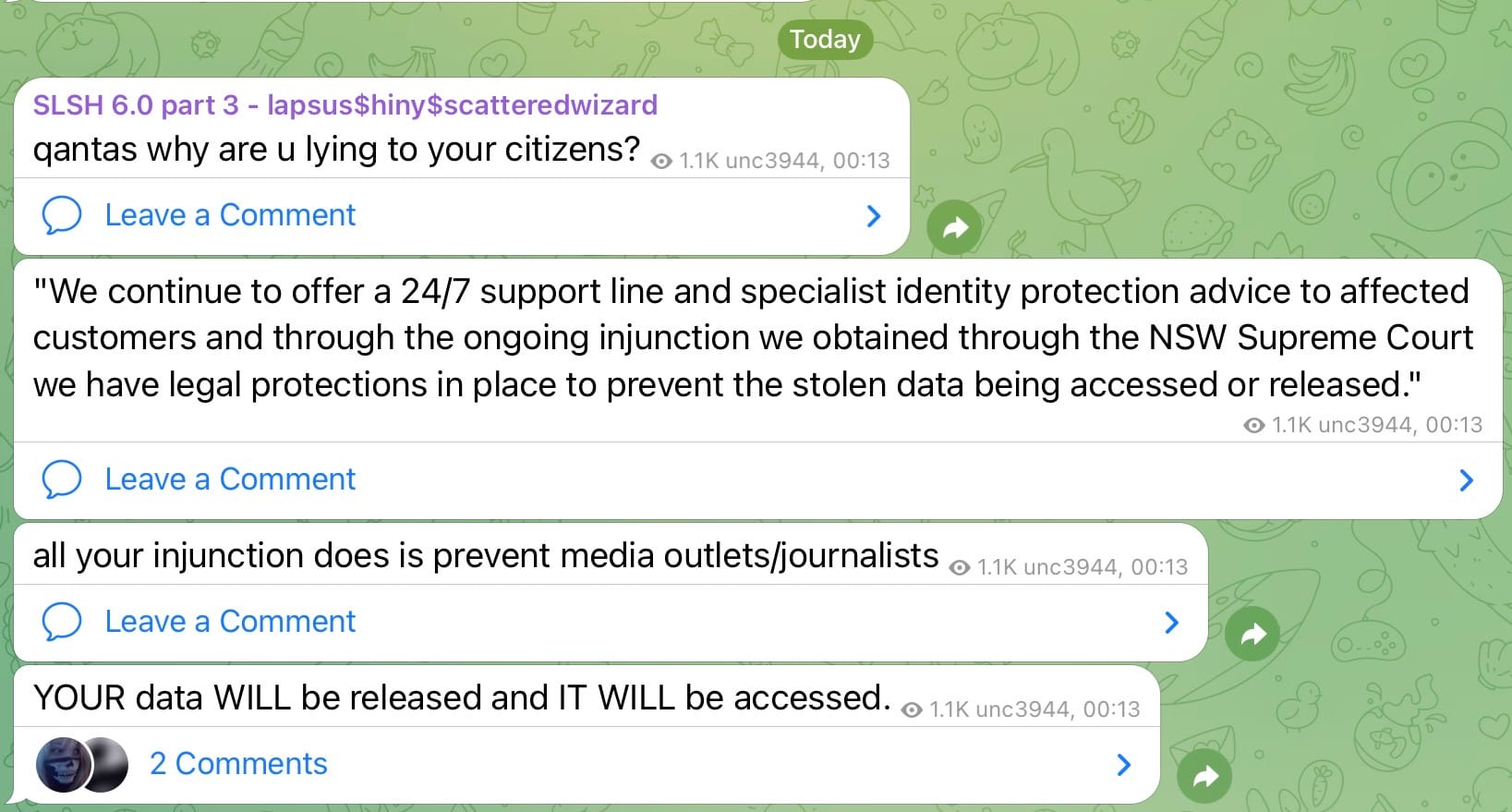Cyber Security News Aggregator
.Cyber Tzar
provide acyber security risk management
platform; including automated penetration tests and risk assesments culminating in a "cyber risk score" out of 1,000, just like a credit score.Court Injunctions are the Thoughts and Prayers of Data Breach Response
published on 2025-10-09 00:03:52 UTC by Troy HuntContent:

You see it all the time after a tragedy occurs somewhere, and people flock to offer their sympathies via the "thoughts and prayers" line. Sympathy is great, and we should all express that sentiment appropriately. The criticism, however, is that the line is often offered as a substitute for meaningful action. Responding to an incident with "thoughts and prayers" doesn't actually do anything, which brings us to court injunctions in the wake of a data breach.
Let's start with HWL Ebsworth, an Australian law firm that was the victim of a ransomware attack in 2023. They were granted an injunction, which means the following:
The final interlocutory injunction restrained hackers from the ALPHV, or “BlackCat”, hackers group from publishing the HWL data on the internet, sharing it with any person, or using the information for any reason other than for obtaining legal advice on the court’s orders.
To paraphrase, the injunction prohibits the Russian crime gang that hacked the law firm and attempted to extort them from publishing the data on the internet. Right... The threat actor was subsequently served with the injunction, to which, per the article, they responded in an entirely predictable fashion:
Fuck you fuckers
And then they dumped a huge trove of data. Clearly, criminals aren't going to pay any attention whatsoever to an injunction, but this legal construct has reach far beyond just the bad guys:
The injunction will also “assist in limiting the dissemination of the exfiltrated material by enabling HWLE to inform online platforms, who are at risk of publishing the material”, Justice Slattery said.
In other words, the data is also off limits to the good guys. Journalists, security firms and yes, Have I Been Pwned (HIBP) are all impacted by injunctions like this. To some extent, you can understand this when the data is as sensitive as what a law firm typically holds, and you need only use a little bit of imagination to picture how damaging it can be for data like this to fall into the wrong hands. But data in a breach of a company like Qantas is very different:
And now here’s mine. Still no indication of specifically which service was breached, but feels very much like loyalty program data (i.e. nothing to do with specific flights, password, passport or payment details). pic.twitter.com/r7KnlfM8TV
— Troy Hunt (@troyhunt) July 11, 2025
As well as my interest in running HIBP, I also appear to be a victim of their data breach, along with my wife and kids. And just to highlight how much skin I have in the game, I'm also a Qantas shareholder and a very loyal customer:
Sitting at the airport about to take my 301st (tracked) @Qantas flight. Nice banter with the staff: “you can lose my data, just don’t lose my bags” 😬 pic.twitter.com/ZGxc4I0aB1
— Troy Hunt (@troyhunt) July 2, 2025
As such, I was particularly interested when they applied for, and were granted, a court injunction of their own. Why? What possible upside does this provide? Because by now, it's pretty clear what's going to happen to the data:

This is from a Telegram channel run by the group that took the Qantas data, along with some other huge names:
🚨🚨🚨BREAKING - New data leak site by Scattered LAPSUS$ Hunters exposes Salesforce customers. Dozens of global companies involved in a large-scale extortion campaign.
— Hackmanac (@H4ckmanac) October 3, 2025
Scattered LAPSUS$ Hunters claims to have breached Salesforce, exfiltrating ~1B records.
They accuse Salesforce… pic.twitter.com/u2PAO7miyP
"Scattered LAPSUS$ Hunters" is threatening to dump all the data publicly in a couple of days' time unless a ransom is paid, which it won't be. The quote from the Telegram image is from a Qantas spokesperson, and clearly, the injunction is not going to stop the publishing of data. Much of my gripe with injunctions is the premise that they in some way protect customers (like me), when clearly, they don't. But hey, "thoughts and prayers", right?
Without wanting to give too much credit to criminals attempting to ransom my data (and everyone else's), they're right about the media outlets. An injunction would have had a meaningful impact on the Ashley Madison coverage a decade ago, where the press happily outed the presence of famous people in the breach. Clearly, the Qantas data is nowhere near as newsworthy, and I can't imagine a headline going much beyond the significant point balances of certain politicians. The data just isn't that interesting.
The injunction is only effective against people who meet the following criteria:
- People who know there's an injunction in place
- People who are law-abiding
- People in Australia *
The first two points are obvious, and an asterix adorns the third as it's very heavily caveated. This from a chat with a lawyer friend thir morning who specialises in this space:
it would depend on which country and whether it has a reciprocal agreement with Australia eg like the UK and also who you are trying it enforce it against and then it’s up to the court in that country to determine - but as this is an injunction (so not eg for a debt against a specific person) it’s almost impossible - you can’t just register a foreign judgement somewhere against the world at large as far as I know.
So, if the injunction is so useless at providing meaningful protections to data breach victims, what's the point? Who does it protect? In researching this piece, the best explanation I could find was from law firm Clayton Utz:
Where that confidentiality is breached due to a hack, parties should generally do - and be seen to be doing - what they can to prevent or minimise the extent of harm. Even if injunctions might not impact hackers, for the reasons set out above, they can provide ancillary benefits in relation to the further dissemination of hacked information by legitimate individuals and organisations. Depending on the terms, it might also assist with recovery on relevant insurance policies and reduce the risk of securities class actions being brought.
That term - "be seen to be doing" - says it all. This is now just me speculating, but I can envisage lawyers for Qantas standing up in court when they're defending against the inevitable class actions they'll face (which I also have strong views on), saying "Your honour, we did everything we could, we even got an injunction!" In a previous conversation I had regarding another data breach that had successfully been granted an injunction, I was told by the lawyer involved that they wanted to assure customers that they'd done everything possible. That breach was subsequently circulated online via a popular clear web hacking site (not "the dark web"), but I assume this fact and the ineffectiveness of the injunction on that audience was left out of customer communications. I feel pretty comfortable arguing that the primary beneficiary of the injunction is the shareholder, rather than the customer. And I assume the lawyers charge for their time, right?
Where this leaves us with Qantas is that, on a personal note, as a law-abiding Australian who is aware of the injunction, I won't be able to view my data or that of my kids. I can always request it of Qantas, of course, but I won't be able to go and obtain it if and when it's spread all over the internet. The criminals will, of course, and that's a very uncomfortable feeling.
From an HIBP perspective, we obviously can't load that data. It's very likely that hundreds of thousands of our subscribers will be impacted, and we won't be able to let them know (which is part of the reason I've written this post - so I can direct them here when asked). Granted, Qantas has obviously sent out disclosure notices to impacted individuals, but I'd argue that the notice that comes from HIBP carries a different gravitas: it's one thing to be told "we've had a security incident", and quite another to learn that your data is now in circulation to the extent that it's been sent to us. Further, Qantas won't be notifying the owners of the domains that their customers' email addresses are on. Many people will be using their work email address for their Qantas account, and when you tie that together with the other exposed data attributes, that creates organisational risk. Companies want to know when corporate assets (including email addresses) are exposed in a data breach, and unfortunately, we won't be able to provide them with that information.
I understand that Qantas' decision to pursue the injunction is about something much broader than the email addresses potentially appearing in HIBP. I actually think much of the advice Qantas has given is good, for example, the resources they've provided on their page about the breach:

These are all fantastic, and each of them has many good external resources people worried about scams should refer to. For example, ScamWatch has this one:

And cyber.gov.au has a handy tip courtesy of our Australian Signals Directorate makes this suggestion:

Not to miss a beat, our friends at IDCARE also offer great advice:

And, of course, the OAIC has some fantastic guidance too:

The scam resources Qantas recommends all link through to a service that will never return the Qantas data breach. Did I mention "thoughts and prayers" already?
https://www.troyhunt.com/court-injunctions-are-the-thoughts-and-prayers-of-data-breach-response/
Published: 2025 10 09 00:03:52
Received: 2025 10 09 01:37:48
Feed: Troy Hunt's Blog
Source: Troy Hunt's Blog
Category: Cyber Security
Topic: Cyber Security
Views: 16
